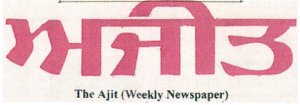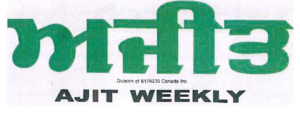A recent decision of the Federal Court 2018 applies the direction of the Federal Court of Appeal in a case where the plaintiff relied on goodwill when it did not carry on business in Canada.
The Facts
The plaintiff is the owner and publisher of an Indian Punjabi-language daily newspaper called the “Ajit Daily”. This paper has been published in India since 1955 and is well-known among the Punjabi population in India. An online version has been available since 2002 which Canadian Punjabis read.
While only a small number of subscriptions have been sold in Canada the plaintiff presented the evidence of a number of individuals who said they were aware of the Ajit Daily and its reputation as an important Punjabi paper in India.
The defendant owns and publishes a Canadian Punjabi-language newspaper called the “Ajit Weekly.” The newspaper has been published in Canada since 1993 and is distributed without charge at the front of supermarkets and other stores. An online version has been available since 1998.
The Action
The plaintiff commenced an action in the Federal Court asserting a claim for passing off and copyright infringement. One of the issues concerning the copyright claim was the impact of a partial settlement agreement previously entered into by the parties relating to litigation between them in the U.S.
After a motion for a summary trial the judge dismissed the action. The plaintiff appealed to the Federal Court of Appeal who allowed the appeal and ordered that a new trial take place. We discussed this decision in March of 2016.
The New Trial
The plaintiff’s logo for its newspaper originally looked like this:

The defendant’s initial logo looked like this:

The partial settlement agreement required the defendant to change its logo so it looked like this:

Passing Off
To establish a claim for passing-off under common law and the Trade-marks Act, the plaintiff must prove the existence of goodwill, deception of the public due to a misrepresentation, and actual or potential damage to the plaintiff.
The judge found that the high degree of recognition of the plaintiff’s mark among the relevant universe of consumers, together with its distinctiveness and the narrow, specialized channel of trade, supported the conclusion that, as of 1993, when the defendant began to use its initial logo, the plaintiff enjoyed sufficient goodwill within Canada to sustain a claim of passing-off. The defendant offered no credible explanation for its decision to use the “Ajit” name in Canada when it launched its Weekly in 1993. Its decision supported the inference that the name had commercial value in Canada at that time.
The second element of misrepresentation is satisfied if a plaintiff establishes that the defendant has used a trademark that is likely to be confused with the plaintiff’s distinctive mark. The judge had no hesitation in finding that the defendant’s initial logo was confusingly similar to the plaintiff’s logo. The respective trademarks were not simply the word “Ajit” but, rather, the word and the stylized way in which it is presented as part of their logos.
The judge was not persuaded that the defendant’s revised logo was confusingly similar to the plaintiff’s logo. The revised logo dispenses with the stylized “hook” of the plaintiff’s mark, and was presented in a different colour. The plaintiff agreed in the partial settlement agreement that the revised logo was sufficiently different to avoid infringing the plaintiff’s copyright in the image. As a result, it was counterintuitive to suggest it was not sufficiently different to avoid confusion in the marketplace.
The plaintiff’s successful claim for passing-off covered the period July 2007, three years before this action was commenced, to January 2010, when the defendant adopted its revised logo. There was no direct or circumstantial evidence that the defendant’s activities had any real impact on the plaintiff’s business. As a result, damages were at the lower end of the scale and set at $5,000.00.
The plaintiff had obtained a trademark registration for its logo after the appeal and amended its statement of claim to allege trademark infringement but the judge reached a similar conclusion concerning this claim.
Because there was no evidence that the defendant intends to revert to its original logo, the judge concluded there was no need to grant injunctive relief. In addition, a claim for punitive damages was dismissed.
A similar award of nominal damages was made concerning the claim for copyright infringement.
In its decision on the appeal the Federal Court of Appeal said that damage could be established through proof of a loss of control over reputation, image or goodwill. However, this is not mentioned in the current decision.
Conclusion
The parties to this action have a long history of litigation in Canada, the United States and the United Kingdom. In this action there has been a summary trial, an appeal to the Federal Court of Appeal and a motion for summary judgement. It seems likely there may be an additional appeal.
If you have any questions or concerns please contact me at mckeown@gsnh.com.
Goldman Sloan Nash & Haber LLP
480 University Avenue, Suite 1600
Toronto, Ontario M5G 1V2
Direct Line: (416) 597-3371
Fax: (416) 597-3370
Email: mckeown@gsnh.com
These comments are of a general nature and not intended to provide legal advice as individual situations will differ and should be discussed with a lawyer.
